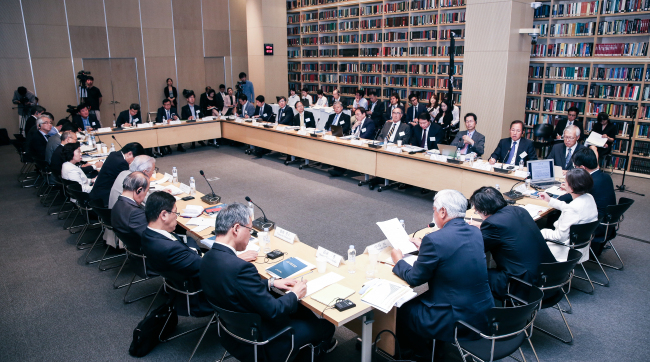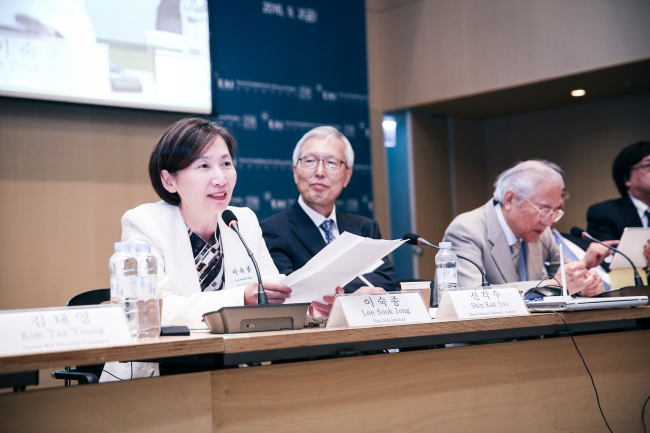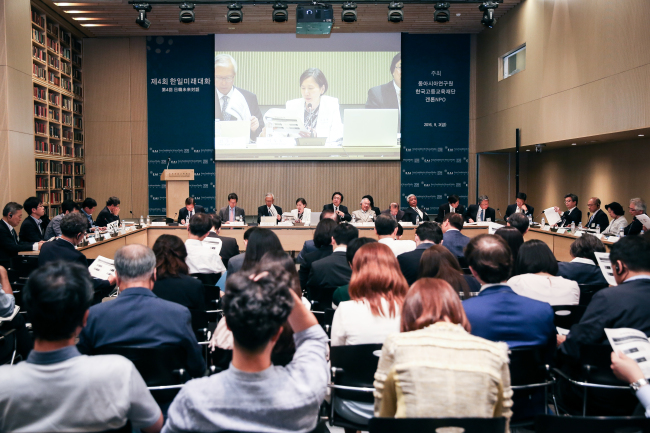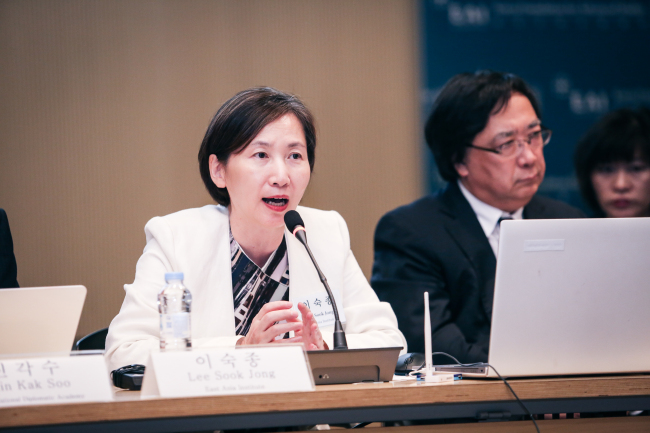Forum ponders constructive path for Korea, Japan
Amid the prolonged rift between Japan and Korea, a group of experts from diverse fields met in early September to probe ways to narrow the fissures and plan a more constructive future.
The event, titled the “4th Korea-Japan Future Dialogue,” gathered 30 opinion leaders from both countries representing academia, media, politics, law and public administration. It was jointly organized by the East Asia Institute, Korea Foundation for Advanced Studies and Genron NPO.
Out of the disparate analyses, the participants shared the view that the two nations should invest more energy into mending fences, particularly through civil society and individuals.
The event, titled the “4th Korea-Japan Future Dialogue,” gathered 30 opinion leaders from both countries representing academia, media, politics, law and public administration. It was jointly organized by the East Asia Institute, Korea Foundation for Advanced Studies and Genron NPO.
Out of the disparate analyses, the participants shared the view that the two nations should invest more energy into mending fences, particularly through civil society and individuals.
 |
| Thirty opinion leaders from Korea and Japan representing academia, media, politics, law and public administration discuss ways to improve relations between the two countries at the fourth Korea-Japan Future Dialogue at the Korea Foundation for Advanced Studies in Seoul on Sept. 2. (East Asia Institute) |
“Official relations between Korea and Japan have passed 50 years, and we should plan for the next 50 years by restoring cooperation in the short run and laying out a shared long-term vision,” said Shin Kak-soo, director of the Center for International Law at Korea National Diplomatic Academy.
“We should not take haste in our decision and accumulate synergy and contacts. Through people-to-people ties, we can bridge our gaps. It is critical for us to double down on our common denominators of democracy, market economy, human rights and the rule of law.”
The former Korean ambassador to Japan alleged that Korea lacked understanding of post-war Japan, and rehashed images of colonial Japan instead.
“The attitude of the press should change from one of rationale to rapport for Japan, and from commotion to coolheadedness for Korea,” he advised.
Ogura Kazuo, adviser to the Japan Foundation and former Japanese ambassador to Korea, noted that the two sides fundamentally differed in their approaches to dialogue, with Korea fixating on resolving history and Japan focusing on future so as to overcome the past.
“As leading economies of the Asia-Pacific, Korea and Japan should take leadership through the Trans-Pacific Partnership Agreement, ASEAN Plus Three and various other regional free trade arrangements,” said Yamaguchi Tsuyoshi, a member of the House of Representatives of the National Diet and Democratic Party of Japan.
 |
| Lee Sook-jong (left), president of the East Asia Institute and professor of public administration at Sungkyunkwan University, speaks beside Shin Kak-soo (center), director of the Center for International Law at Korea National Diplomatic Academy. (East Asia Institute) |
Stressing the importance of communication between citizens, Lee Sook-jong, president of the East Asia Institute and professor of public administration at Sungkyunkwan University, said there have been some improvement in mutual perceptions, but these have not recovered to pre-2012 levels (before Korean President Park Geun-hye and Japanese Prime Minister Abe Shinzo assumed office).
She added that many Japanese nationals have felt fatigued by Korea’s dogged historical demands, while Koreans have been outraged by Japan’s territorial claim over the Dokdo islets and what they see as Tokyo’s halfhearted apology for past misdeeds.
On positive factors, Lee pointed to Korea’s hallyu popular culture boom and Japan’s high living standards and dutiful national character as admired by many Koreans. Highlighting that people cultivate positive impressions after visiting other countries, Lee advised increasing exposure to each other’s culture through mainstream and social media, as well as direct interaction.
Komatsu Hiroshi, chief editorial writer at the Mainichi Shimbun newspaper, argued that the news agencies of both countries should refrain from inflammatory reporting and expand impartial coverage that represents wider voices.
“Japan’s newspapers and popular perceptions are divided ideologically over cardinal issues, including nuclear energy, history, security and constitution,” Komatsu said. “The bifurcation of opinion is natural, and the press critically depends on citizenry that is moderate, rational and discerning.”
Echoing the view, Sunwoo Jung, an editorial writer for the Chosun Ilbo newspaper, conceded that Korea’s fourth estate often indulged in “lax” journalism.
“Strangely, there is a tendency among Korean news outlets to think that it is okay to write unconscionably about Japan and get away with it,” he said, proclaiming that such an “atmosphere” also permeates the society and government.
Noting Tokyo and Seoul have toiled and moiled over the last 20 years to reach an agreement on “comfort women” -- women who were sexually exploited by the Imperial Japanese Army during World War II -- at the end of last year, the journalist contended the Korean media largely ignored the historicity of the affair.
 |
| Thirty opinion leaders from Korea and Japan representing academia, media, politics, law and public administration discuss ways to improve relations between the two countries at the fourth Korea-Japan Future Dialogue at the Korea Foundation for Advanced Studies in Seoul on Sept. 2. (East Asia Institute) |
On international relations, professor Soeya Yoshihide of Keio University’s faculty of law said both Seoul and Tokyo have a collective interest in embracing China’s rise.
“It is inevitable that a large difference exists between the perspective of Korea, which had existed under a Sino-centric influence, and Japan, which invaded the Middle Kingdom,” Soeya said. “The bottom line is that all countries neighboring and near China should develop a system that coexists with the nation. There will be a paradigm shift if Korea and Japan join hands under this framework.”
Assuaging Korea’s concerns over Japan’s military legislation that was passed in September last year, which allows its Self-Defense Forces to participate in foreign conflicts, the professor asserted that Tokyo will provide support alongside Washington to Seoul in the event of war on the peninsula.
“If security cooperation and military exercises between Washington, Seoul and Tokyo become commonplace, all parties should plan out a new regional order in East Asia that incorporates China,” the professor said.
“At the same time, to curb Beijing’s nationalistic and territorial ambitions, the citizens of Korea and Japan need to strengthen ties with China’s civil societies, which can check the Chinese Communist Party’s excesses. This is ultimately related to China’s democratization.”
Professor Sohn Yul of Yonsei University’s Graduate School of International Studies argued that a 21st century regional order in East Asia will be unfeasible with Washington dragging Tokyo and Seoul into its orbit for encircling Beijing.
Following the presidential election on Nov. 8, the US is likely to apply pressure next year to flesh out a trilateral security cooperation with Korea and Japan, he claimed, adding that rescuing relations between the two Asian countries will be vital.
“In this regard, we need a political leadership that can spearhead two-track diplomacies encompassing historical settlement on one hand and the economy and security on the other,” he suggested. “The tripartite alliance should be steadfast in countering North Korea’s nuclear and missile provocations, but not entrap South Korea in the geostrategic competition between China and the US, alongside Japan. Tokyo and Seoul need to put their heads together on this topic.”
 |
| Lee Sook-jong (left), president of the East Asia Institute and professor of public administration at Sungkyunkwan University. (East Asia Institute) |
In the economic sphere, Korea and Japan should bolster partnerships to hedge against possible protectionist measures by the US, Sohn indicated, arguing the two countries must work in cahoots to prevent the Trans-Pacific Partnership from collapsing.
“Unlike the adversarial nature of security, trade and commerce can be multilateral and win-win to all,” he added. “However, progress in Trans-Pacific Partnership and Asia Infrastructure Investment Bank initiatives has been slow due to the muddling of strategic interests.”
Professor Kawai Masahiro of the University of Tokyo maintained that the economy has a crucial role to play. Noting China’s economy is still growing at a rapid pace, he said calibrating relations with China will be instrumental to the prosperity of Korea and Japan.
“Korea and Japan share many problems that can be solved together,” Kawai said, referring to the aging society, low growth and need for structural reforms.
Warning against the Chinese economy’s potential implosion, professor Fukagawa Yukiko of Waseda University recommended invigorating free trade and encouraging entrepreneurship. She also counseled giving more power and options to the young in the coming age of the old.
“Our bilateral relations currently have no way out due to historical problems,” said SBS journalist Lee Byung-hee. “But we have a host of common problems concerning our population, the environment and energy. Therefore, if we tackle these problems first we may be able to resolve our deeper differences.”
Lee advocated boosting youth exchanges, as France and Germany did following the Elysee Treaty of 1963 -- also known as the “treaty of friendship” -- which ended centuries of hostility.
“The relations between France and Germany were completely upended following the treaty,” explained Lee. “The two peoples became close friends from bitter enemies. The success was due to the Franco-German Youth Office, which institutionalized exchange programs for youths. Establishing a similar institution will be beneficial to Korea and Japan in the long run.”
Professor Lee Jae-seung of Korea University’s Graduate School of International Studies agreed, adding that “reconciliation is not an event, but a process.”
“It took over 50 years for France and Germany to publish a joint textbook following the Elysee Treaty,” he said. “Preparing for a shared future beyond Korea and Japan, onto Northeast Asia and East Asia, will be practical in paring down the political costs.”
Lee added, “That means transforming the politics of soliloquy into the politics of solidarity. Communication between Seoul, Tokyo and Beijing is always in need.”
By Joel Lee (joel@heraldcorp.com)